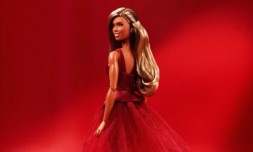The brand just introduced the first blind or visually impaired Barbie doll, and the internet is loving it.
Representation matters, and Mattel – a brand who has long championed this belief – isn’t slowing down in their quest to make every person feel seen.
The iconic toy company has once again proven its dedication to inclusivity with its latest release: a Barbie doll that is blind and/or visually impaired.
Though often criticised for promoting unrealistic beauty standards and lacking diversity, Barbie has been a cultural touchstone for decades – a status that was reinvigorated by the blockbuster Hollywood film released in 2023.
And where Mattel has lacked in the past, it’s certainly making up for lost time. In recent years, the brand has launched a range of unique dolls representing consumers from all walks of life.
From a Barbie that uses a wheelchair, to a transgender Barbie and a Barbie with hearing aids, Mattel has quickly established itself as a trailblazer when it comes to inclusivity within the children’s toy market.
Blind/visually impaired Barbie is no different, and the positive reacting to the launch has confirmed what many have known for years now – that consumers want products that reflect their realties, not least when it comes to young people.
The doll has been designed with one eye that gazes slightly up and out to reflect the sometimes-distinct eye gaze of a blind person.
It also comes with a red-tipped cane, signifying a visually impaired person, sunglasses, textured and vibrant fabrics, as well as Velcro fastenings and elbow articulations to ensure comfortable cane use.
Social media posts highlighting the new doll garnered thousands of likes and comments shortly after the launch.
‘Fantastic representation! Let’s keep this pattern and spread the love!’ said one user.
Another echoed this sentiment, stating, ‘Inclusivity is so important for positive self image’.
The conversation hasn’t been limited to social media. Disability advocates and influencers have also weighed in, commending Mattel for their efforts.
Blind disability activist and broadcaster Lucy Edwards was the first blind person in the UK to meet the new doll.
‘This to me is just another step in that journey that finally we are creating a world that is made for blind young people to thrive’ Edwards said. ‘And if Barbie can be blind that means I can be blind and that is so important for the confidence of young people today.’
Online comments, however, haven’t been all positive. Some social netizens have called out Mattel for churning out another doll that ticks a diversity box, without – ostensibly – making any major changes to the design.
‘Is this a joke?’ said one comment. ‘The only difference is the cane!’




















